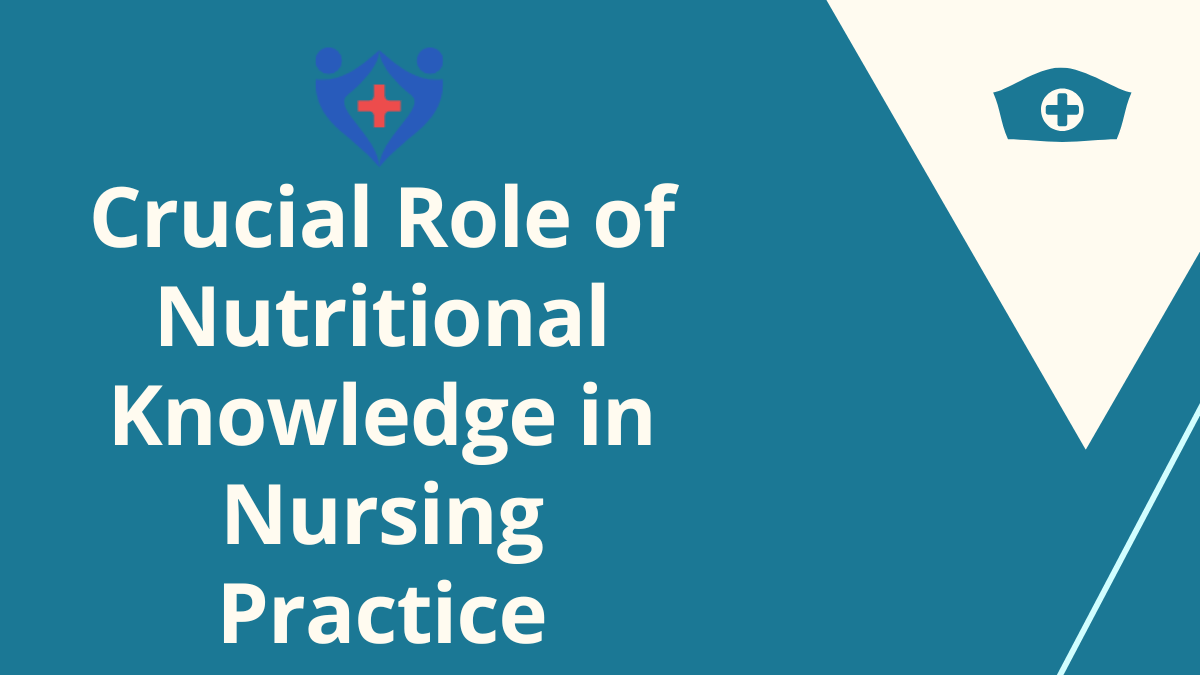Nutritional knowledge is an indispensable aspect of nursing practice, profoundly impacting patient care and outcomes. In today’s healthcare landscape, where chronic diseases and lifestyle-related illnesses prevail, understanding the intricate relationship between nutrition and health is paramount. This article delves into the importance of nutritional knowledge in nursing practice, elucidating its significance, challenges, and potential solutions.
Understanding the Significance of Nutritional Knowledge in Nursing:
The Foundation of Holistic Patient Care (H2) Nutrition serves as the cornerstone of holistic patient care. Nurses, as frontline healthcare providers, play a pivotal role in addressing patients’ nutritional needs. By possessing comprehensive nutritional knowledge, nurses can assess, plan, and implement interventions that promote optimal health and well-being.
Impact on Patient Outcomes (H2) Research consistently demonstrates the profound impact of nutrition on patient outcomes. From accelerating recovery times to reducing the risk of complications, adequate nutrition significantly influences morbidity and mortality rates. Nurses armed with robust nutritional knowledge can facilitate positive outcomes and enhance the overall quality of patient care.
Prevention and Management of Chronic Conditions (H2) Chronic conditions such as diabetes, cardiovascular disease, and obesity are prevalent in today’s society. Nutrition plays a central role in both the prevention and management of these conditions. Nurses equipped with expertise in nutrition can educate patients on dietary modifications, empowering them to make informed choices that mitigate the progression of chronic diseases.
Table: Impact of Nutritional Interventions on Patient Outcomes
| Nutritional Intervention | Patient Outcomes |
|---|---|
| Adequate Protein Intake | Accelerated Wound Healing |
| Balanced Diet | Reduced Risk of Malnutrition |
| Controlled Sodium Intake | Lowered Blood Pressure |
| Glycemic Control | Improved Diabetes Management |
| Omega-3 Fatty Acids Supplementation | Reduced Risk of Cardiovascular Events |
Challenges in Integrating Nutritional Knowledge into Nursing Practice:
Time Constraints and Workload Pressures (H2) In the fast-paced healthcare environment, nurses often face time constraints and heavy workloads. Integrating nutritional assessments and interventions into routine care can be challenging amidst competing priorities. As a result, nutritional counseling and education may receive inadequate attention, compromising patient outcomes.
Lack of Formal Education and Training (H2) Despite its significance, nutritional education is often insufficient in nursing curricula. Many nursing programs lack dedicated coursework on nutrition, leaving graduates ill-equipped to address patients’ dietary needs effectively. This deficiency underscores the importance of ongoing professional development in the field of nutrition for nurses.
Complexity of Nutritional Science (H2) Nutritional science is a dynamic and multifaceted field, characterized by evolving research and guidelines. Nurses must navigate complex nutritional concepts and stay abreast of emerging evidence-based practices. However, the sheer breadth and depth of nutritional knowledge can pose challenges for nurses seeking to integrate this information into their clinical practice.
Empowering Nurses with Nutritional Knowledge:
Integration of Nutrition into Nursing Curricula (H2) To address the gap in nutritional education, nursing schools must prioritize the integration of nutrition-related coursework into their curricula. By providing comprehensive instruction on nutritional assessment, counseling, and interventions, nursing programs can better prepare students for the complexities of modern healthcare practice.
Continuing Education and Professional Development (H2) Continuing education opportunities play a crucial role in enhancing nurses’ nutritional knowledge and skills. Workshops, seminars, and online courses offer avenues for nurses to expand their understanding of nutrition and its implications for patient care. Healthcare organizations should support and incentivize nurses’ participation in such educational endeavors.
Interdisciplinary Collaboration (H2) Effective nutrition care requires interdisciplinary collaboration among healthcare professionals. Nurses should collaborate closely with registered dietitians, physicians, and other members of the healthcare team to develop comprehensive nutrition care plans tailored to patients’ individual needs. By leveraging each team member’s expertise, nurses can optimize patient outcomes and promote holistic care.
Conclusion:
In conclusion, nutritional knowledge is indispensable for nurses in providing holistic patient care and improving outcomes. Despite the challenges posed by time constraints, educational gaps, and the complexity of nutritional science, nurses can empower themselves through ongoing education, interdisciplinary collaboration, and a commitment to evidence-based practice. By recognizing the critical role of nutrition in healthcare and equipping themselves with the necessary knowledge and skills, nurses can truly make a difference in the lives of their patients.

